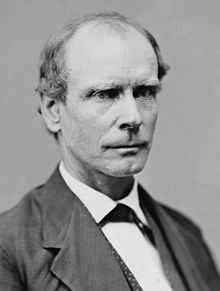Amos T. Akerman | |
|---|---|
 | |
| 31st United States Attorney General | |
| In office November 23, 1870 – December 13, 1871 | |
| President | Ulysses S. Grant |
| Preceded by | Ebenezer R. Hoar |
| Succeeded by | George Henry Williams |
| Personal details | |
| Born | Amos Tappan Akerman February 23, 1821 Portsmouth, New Hampshire, U.S. |
| Died | December 21, 1880 (aged 59) Cartersville, Georgia, U.S. |
| Resting place | Oak Hill Cemetery (Cartersville, Georgia) |
| Political party | Whig (before 1860) Republican (1865–1880) |
| Spouse | Martha Galloway |
| Education | Dartmouth College (BA) |
| Military service | |
| Allegiance | Confederate States |
| Branch/service | Confederate Army |
| Years of service | 1863–1865 |
| Rank | Colonel |
| Battles/wars | American Civil War |
Amos Tappan Akerman (February 23, 1821 – December 21, 1880) was an American politician who served as United States Attorney General under President Ulysses S. Grant from 1870 to 1871. A native of New Hampshire, Akerman graduated from Dartmouth College in 1842 and moved South, where he spent most of his career. He first worked as headmaster of a school in North Carolina and as a tutor in Georgia. Having become interested in law, Akerman studied and passed the bar in Georgia in 1850; where he and an associate set up a law practice. He also owned a farm and enslaved eleven people. When the American Civil War broke out in 1861, Akerman joined the Confederate Army, where he achieved the rank of colonel.
After the end of the war in 1865, Akerman joined the Republican Party during Reconstruction. He became an outspoken attorney advocate for freedmen's civil rights in Georgia. Akerman was appointed by President Ulysses S. Grant as his U.S. Attorney General; with Grant's support, he vigorously prosecuted the Ku Klux Klan under the Enforcement Acts. Akerman was assisted by Solicitor General Benjamin Bristow in the newly established Department of Justice. Attorney General Akerman also prosecuted important land grant cases that concerned railroads in a rapidly expanding West. Akerman advised on the United States first federal Civil Service Reform law implemented by President Grant and the U.S. Congress. Possibly due to Akerman's rulings against the Union Pacific Railroad, Grant asked for Akerman's resignation from the cabinet.[citation needed] Although Akerman left office at Grant's request, he continued to support Grant. He returned to Georgia, practiced law, and remained highly popular in the state.[citation needed]